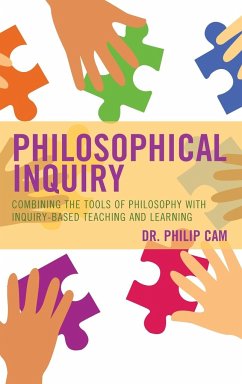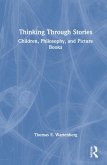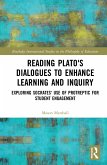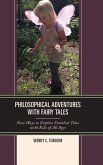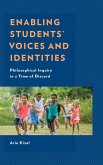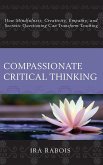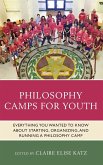Philip Cam
Philosophical Inquiry
Combining the Tools of Philosophy with Inquiry-based Teaching and Learning
Philip Cam
Philosophical Inquiry
Combining the Tools of Philosophy with Inquiry-based Teaching and Learning
- Gebundenes Buch
- Merkliste
- Auf die Merkliste
- Bewerten Bewerten
- Teilen
- Produkt teilen
- Produkterinnerung
- Produkterinnerung
Philosophical Inquiry introduces teachers to a philosophical approach to collaborative inquiry-based teaching and learning.
Andere Kunden interessierten sich auch für
![Thinking Through Stories Thinking Through Stories]() Thomas E. WartenbergThinking Through Stories180,99 €
Thomas E. WartenbergThinking Through Stories180,99 €![Reading Plato's Dialogues to Enhance Learning and Inquiry Reading Plato's Dialogues to Enhance Learning and Inquiry]() Mason MarshallReading Plato's Dialogues to Enhance Learning and Inquiry199,99 €
Mason MarshallReading Plato's Dialogues to Enhance Learning and Inquiry199,99 €![Philosophical Adventures with Fairy Tales Philosophical Adventures with Fairy Tales]() Wendy C. TurgeonPhilosophical Adventures with Fairy Tales87,99 €
Wendy C. TurgeonPhilosophical Adventures with Fairy Tales87,99 €![Enabling Students' Voices and Identities Enabling Students' Voices and Identities]() Arie KizelEnabling Students' Voices and Identities99,99 €
Arie KizelEnabling Students' Voices and Identities99,99 €![Compassionate Critical Thinking Compassionate Critical Thinking]() Ira RaboisCompassionate Critical Thinking60,99 €
Ira RaboisCompassionate Critical Thinking60,99 €![Thought Experiments Thought Experiments]() Chris EdwardsThought Experiments56,99 €
Chris EdwardsThought Experiments56,99 €![Philosophy Camps for Youth Philosophy Camps for Youth]() Philosophy Camps for Youth83,99 €
Philosophy Camps for Youth83,99 €-
-
-
Philosophical Inquiry introduces teachers to a philosophical approach to collaborative inquiry-based teaching and learning.
Produktdetails
- Produktdetails
- Verlag: Rowman & Littlefield Publishers
- Seitenzahl: 174
- Erscheinungstermin: 11. Januar 2020
- Englisch
- Abmessung: 235mm x 157mm x 14mm
- Gewicht: 412g
- ISBN-13: 9781475846287
- ISBN-10: 1475846282
- Artikelnr.: 57747767
- Herstellerkennzeichnung
- Libri GmbH
- Europaallee 1
- 36244 Bad Hersfeld
- gpsr@libri.de
- Verlag: Rowman & Littlefield Publishers
- Seitenzahl: 174
- Erscheinungstermin: 11. Januar 2020
- Englisch
- Abmessung: 235mm x 157mm x 14mm
- Gewicht: 412g
- ISBN-13: 9781475846287
- ISBN-10: 1475846282
- Artikelnr.: 57747767
- Herstellerkennzeichnung
- Libri GmbH
- Europaallee 1
- 36244 Bad Hersfeld
- gpsr@libri.de
Dr. Philip Cam is an international authority on philosophy in schools, who has run workshops for educators in many countries, and whose books for teachers and children have been widely translated. He has a DPhil in Philosophy from the University of Oxford and has had a long university career in Australia.
Preface Acknowledgments Introduction Chapter 1: Getting Started Arranging
the Classroom and Setting the Rules Structuring a Lesson A Toolkit for
Thinking Learning Outcomes Chapter 2: Questioning Question Starters
Thinking about Response Demands The Question Quadrant Factual, Evaluative
and Conceptual Questions Setting an Agenda Unpacking Problems and Questions
The Teacher as Procedural Questioner The Characteristics of Philosophical
Questions Constructing Discussion Plans Exercises and Activities Chapter 3:
Conceptual Exploration Categorical Operations Comparative Operations
Complex Concepts Clarification Exercises and Activities Chapter 4:
Reasoning The Language of Reasoning Justification and Inference Conditional
Reasoning Deductive Reasoning Inductive Reasoning Necessary and Sufficient
Conditions Contradiction and Logical Impossibility Analyzing and Evaluating
Reasoning Mapping Arguments in Discussion Exercises and Activities
Bibliography
the Classroom and Setting the Rules Structuring a Lesson A Toolkit for
Thinking Learning Outcomes Chapter 2: Questioning Question Starters
Thinking about Response Demands The Question Quadrant Factual, Evaluative
and Conceptual Questions Setting an Agenda Unpacking Problems and Questions
The Teacher as Procedural Questioner The Characteristics of Philosophical
Questions Constructing Discussion Plans Exercises and Activities Chapter 3:
Conceptual Exploration Categorical Operations Comparative Operations
Complex Concepts Clarification Exercises and Activities Chapter 4:
Reasoning The Language of Reasoning Justification and Inference Conditional
Reasoning Deductive Reasoning Inductive Reasoning Necessary and Sufficient
Conditions Contradiction and Logical Impossibility Analyzing and Evaluating
Reasoning Mapping Arguments in Discussion Exercises and Activities
Bibliography
Preface Acknowledgments Introduction Chapter 1: Getting Started Arranging
the Classroom and Setting the Rules Structuring a Lesson A Toolkit for
Thinking Learning Outcomes Chapter 2: Questioning Question Starters
Thinking about Response Demands The Question Quadrant Factual, Evaluative
and Conceptual Questions Setting an Agenda Unpacking Problems and Questions
The Teacher as Procedural Questioner The Characteristics of Philosophical
Questions Constructing Discussion Plans Exercises and Activities Chapter 3:
Conceptual Exploration Categorical Operations Comparative Operations
Complex Concepts Clarification Exercises and Activities Chapter 4:
Reasoning The Language of Reasoning Justification and Inference Conditional
Reasoning Deductive Reasoning Inductive Reasoning Necessary and Sufficient
Conditions Contradiction and Logical Impossibility Analyzing and Evaluating
Reasoning Mapping Arguments in Discussion Exercises and Activities
Bibliography
the Classroom and Setting the Rules Structuring a Lesson A Toolkit for
Thinking Learning Outcomes Chapter 2: Questioning Question Starters
Thinking about Response Demands The Question Quadrant Factual, Evaluative
and Conceptual Questions Setting an Agenda Unpacking Problems and Questions
The Teacher as Procedural Questioner The Characteristics of Philosophical
Questions Constructing Discussion Plans Exercises and Activities Chapter 3:
Conceptual Exploration Categorical Operations Comparative Operations
Complex Concepts Clarification Exercises and Activities Chapter 4:
Reasoning The Language of Reasoning Justification and Inference Conditional
Reasoning Deductive Reasoning Inductive Reasoning Necessary and Sufficient
Conditions Contradiction and Logical Impossibility Analyzing and Evaluating
Reasoning Mapping Arguments in Discussion Exercises and Activities
Bibliography

